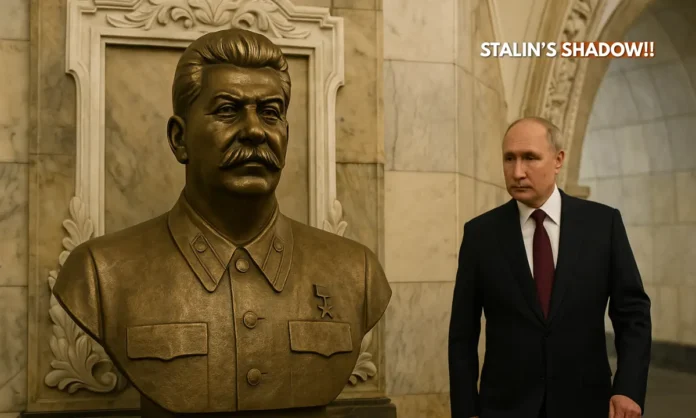Summary
- Stalin’s image is being publicly rehabilitated as a symbol of wartime victory rather than repression.
- Putin’s government intensifies censorship, ideological control, and retroactive prosecutions amid the Ukraine war.
- Public opinion polls show strong support for Putin and rising admiration for Stalin’s “order and achievements.”
Stalin’s Comeback: War Narrative and Political Control
The restoration of a monument to Joseph Stalin at Moscow’s Taganskaya metro station is more than a historical nod—it symbolizes a carefully curated narrative under President Vladimir Putin. As Russia’s war in Ukraine stretches on, Stalin is being reimagined not as the architect of purges and mass deaths, but as a “victorious wartime leader” who ensured national survival. This narrative resonates with Kremlin-backed propaganda, positioning Stalin as a figure of order during crises, while Putin assumes a similar mantle of strength.
Polls by the independent Levada Center show 42% of residents of Russia now view Stalin as the “most outstanding” figure in history—an unprecedented jump from 12% in 1989. Putin himself stands second at 31%, double his pre-invasion rating. The renaming of Volgograd’s airport to Stalingrad in April and speeches from regional governors celebrating Stalin’s “great achievements” highlight this state-led historical revisionism.
The Communist Party’s push for Stalin’s political rehabilitation dovetails with Putin’s aggressive clampdown on dissent. Dissenters face jail under broad laws targeting “extremism” or “discrediting the military,” while books and art critical of the war are blacklisted. Russia’s ruling narrative is thus anchored in past authoritarianism to justify present-day repression.
‘@RepJoeWilson: “war criminal putin is clearly fixated to resurrect the failed soviet union — with troops still in Transnistria, Moldova, rigging elections in Belarus, invading the republic of Georgia and rigging elections against the legitimate president @Zourabichvili_S…” pic.twitter.com/VIDu0DCryE
— Alex Raufoglu (@ralakbar) June 12, 2025
The New Repression: Censorship, Fear, and Retroactive Punishments
- More than 1,400 political prisoners remain behind bars, marking a 25% rise since 2023.
- Blacklists of anti-war artists and banned books create a climate of cultural self-censorship.
- High-profile prosecutions, including treason cases, echo Soviet-style repression but with modern tools.
The Kremlin’s methods are sophisticated yet blunt: censorship now extends beyond preventive controls, with retroactive punishments silencing artists, journalists, and ordinary citizens. Playwrights Svetlana Petriychuk and Yevgenia Berkovich were sentenced to six years for a play that had previously won Russia’s top theatre awards. Ordinary citizens have faced years in prison for social media posts or even private criticism of the Ukraine war.
Security services’ tightening grip on elites has created ripples of fear. The death of Transport Minister Roman Starovoit—deemed a suicide hours after his dismissal—reflects the growing pressure within Putin’s inner circle. Analysts warn of creeping “purges,” with officials fearing sudden accusations of corruption or treason, often linked to wartime failures or financial mismanagement.
Public Sentiment and the Putin-Stalin Parallel
- June polls show 70% of Russians believe the country is on the right track.
- Putin’s approval rating remains high at 86%, reflecting a “stability 2.0” reminiscent of pre-2008 optimism.
- Stalin is increasingly viewed as a manager who built the country, overshadowing his repressive legacy.
Despite international sanctions, economic challenges, and the war’s toll, public sentiment in Russia remains broadly supportive of the Kremlin. Analysts attribute this to controlled media narratives, suppression of dissent, and a sense of nationalistic pride. Stalin’s image—emphasizing “victory” and “resilience”—is being used to strengthen Putin’s own legitimacy.
However, experts like Alexandra Arkhipova warn that the embrace of Stalin risks normalizing authoritarian governance as both historical precedent and contemporary policy. Russia now operates as an “information autocracy,” where control is exerted through propaganda and selective punishment rather than the mass terror of Stalin’s era.
A Legacy Rewritten, A Future Uncertain
The Kremlin’s calculated revival of Stalin underscores the extent to which history is being weaponized in modern Russia. This ideological shift not only seeks to unify society around wartime narratives but also attempts to erase critical perspectives on state power and human rights. While Putin’s government frames these policies as patriotic, the resurgence of Stalinist symbols highlights the fragility of freedom in a nation moving further from democratic norms.


